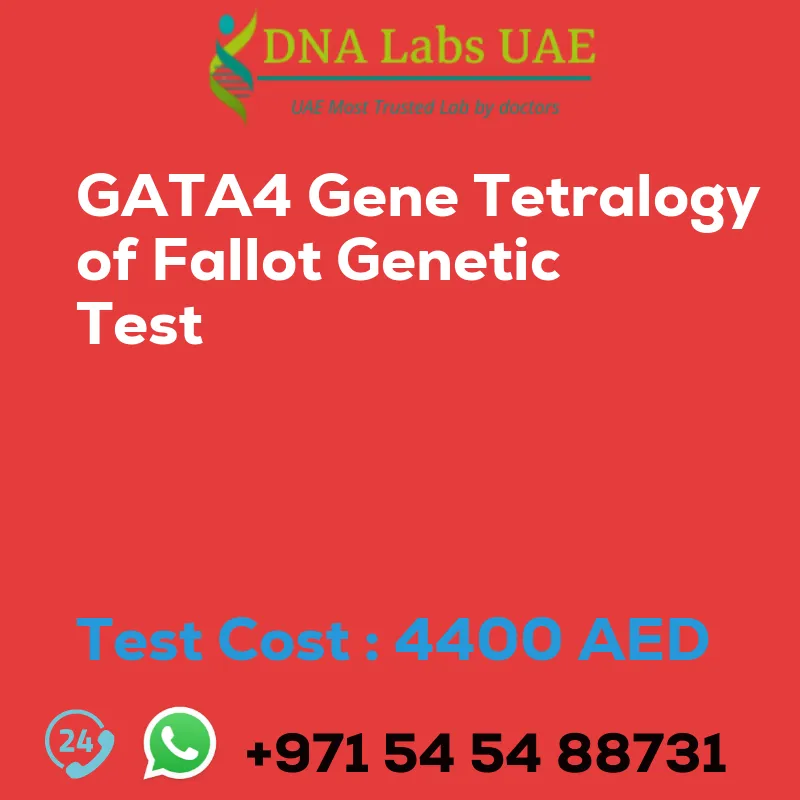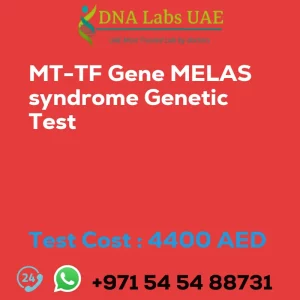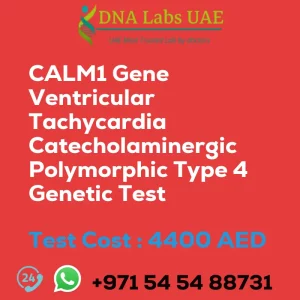GATA4 Gene Tetralogy of Fallot Genetic Test
Welcome to DNA Labs UAE, where we offer the GATA4 Gene Tetralogy of Fallot Genetic Test. This test is designed to provide valuable information for individuals and families affected by Tetralogy of Fallot (TOF), a complex heart defect.
Test Details
The GATA4 gene is a transcription factor that plays a crucial role in heart development. Mutations in this gene have been associated with various congenital heart defects, including TOF. TOF is characterized by four specific abnormalities:
- Ventricular septal defect (hole between the heart’s lower chambers)
- Overriding aorta (the aorta is positioned over the hole)
- Pulmonary stenosis (narrowing of the pulmonary valve and artery)
- Right ventricular hypertrophy (thickening of the right ventricular wall)
Our GATA4 Gene Tetralogy of Fallot Genetic Test utilizes NGS (Next-Generation Sequencing) technology, which allows for high-throughput sequencing and analysis of multiple genes simultaneously. This enables us to identify mutations in the GATA4 gene and other relevant genes associated with TOF.
Test Components and Price
The cost of the GATA4 Gene Tetralogy of Fallot Genetic Test is AED 4400.0. The test can be performed using blood samples, extracted DNA, or one drop of blood on an FTA Card.
Report Delivery and Method
After the test is conducted, the report will be delivered within 3 to 4 weeks. The NGS technology is employed to analyze the genetic information and provide accurate results.
Test Type and Doctor
The GATA4 Gene Tetralogy of Fallot Genetic Test falls under the category of Cardiovascular Pneumology Disorders. The test is typically requested by cardiologists who specialize in heart conditions.
Test Department and Pre Test Information
The GATA4 Gene Tetralogy of Fallot Genetic Test is conducted in our Genetics department. Before the test, it is important to provide the clinical history of the patient who is undergoing the test. Additionally, a genetic counseling session may be conducted to draw a pedigree chart of family members affected by the GATA4 gene mutation.
Benefits of the Test
By identifying specific genetic mutations associated with TOF, the GATA4 Gene Tetralogy of Fallot Genetic Test can provide valuable information for:
- Diagnosing TOF
- Predicting disease severity
- Guiding treatment decisions
- Assessing the risk of recurrence in family members
This information is crucial for personalized medical management and genetic counseling for individuals and families affected by TOF.
| Test Name | GATA4 Gene Tetralogy of Fallot Genetic Test |
|---|---|
| Components | |
| Price | 4400.0 AED |
| Sample Condition | Blood or Extracted DNA or One drop Blood on FTA Card |
| Report Delivery | 3 to 4 Weeks |
| Method | NGS Technology |
| Test type | Cardiovascular Pneumology Disorders |
| Doctor | Cardiologist |
| Test Department: | Genetics |
| Pre Test Information | Clinical History of Patient who is going for GATA4 Gene Tetralogy of Fallot NGS Genetic DNA Test. A Genetic Counselling session to draw a pedigree chart of family members affected with GATA4 Gene Tetralogy of Fallot NGS Genetic DNA Test gene GATA4 |
| Test Details |
The GATA4 gene is a transcription factor that plays a crucial role in heart development. Mutations in this gene have been associated with various congenital heart defects, including Tetralogy of Fallot (TOF). TOF is a complex heart defect characterized by four specific abnormalities: a ventricular septal defect (hole between the heart’s lower chambers), an overriding aorta (the aorta is positioned over the hole), pulmonary stenosis (narrowing of the pulmonary valve and artery), and right ventricular hypertrophy (thickening of the right ventricular wall). NGS (Next-Generation Sequencing) genetic testing is a high-throughput method used to sequence and analyze multiple genes simultaneously. In the context of TOF, NGS genetic testing can be used to identify mutations in the GATA4 gene and other relevant genes associated with the condition. By identifying specific genetic mutations, NGS genetic testing can provide valuable information for diagnosing TOF, predicting disease severity, guiding treatment decisions, and assessing the risk of recurrence in family members. This information can be crucial for personalized medical management and genetic counseling for individuals and families affected by TOF. |








